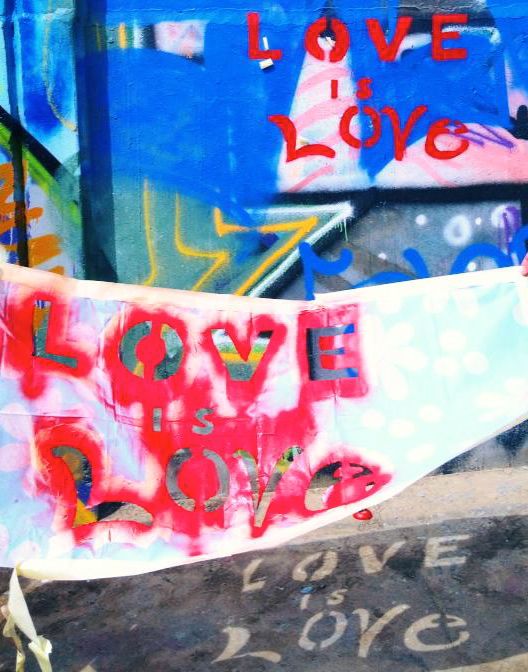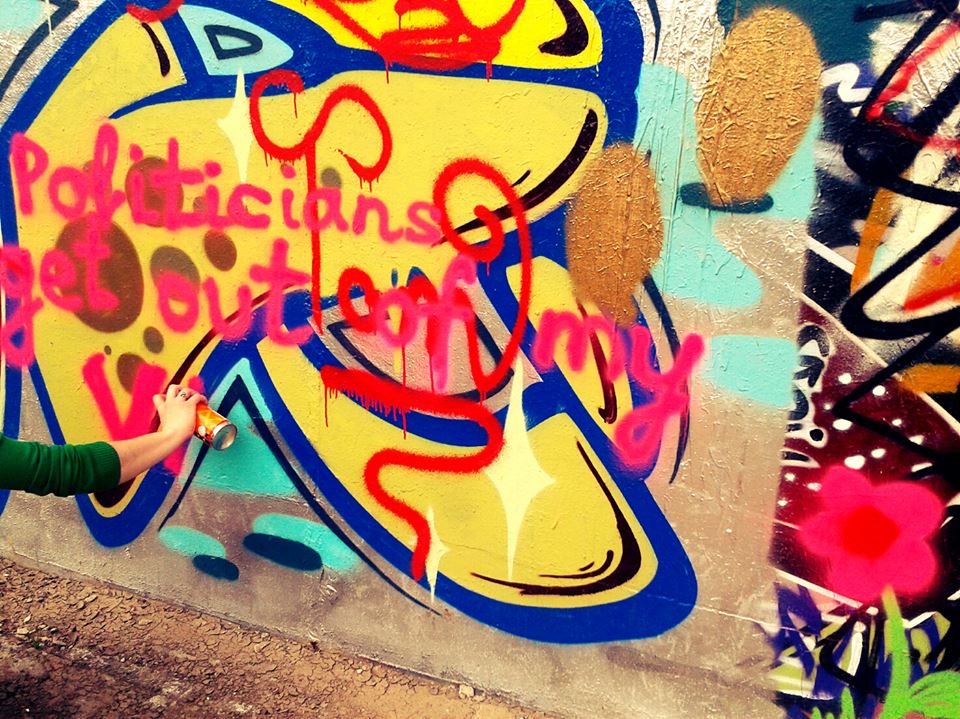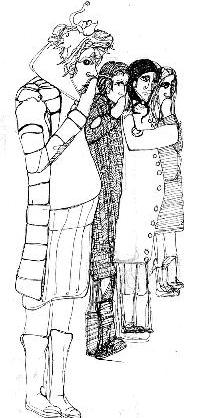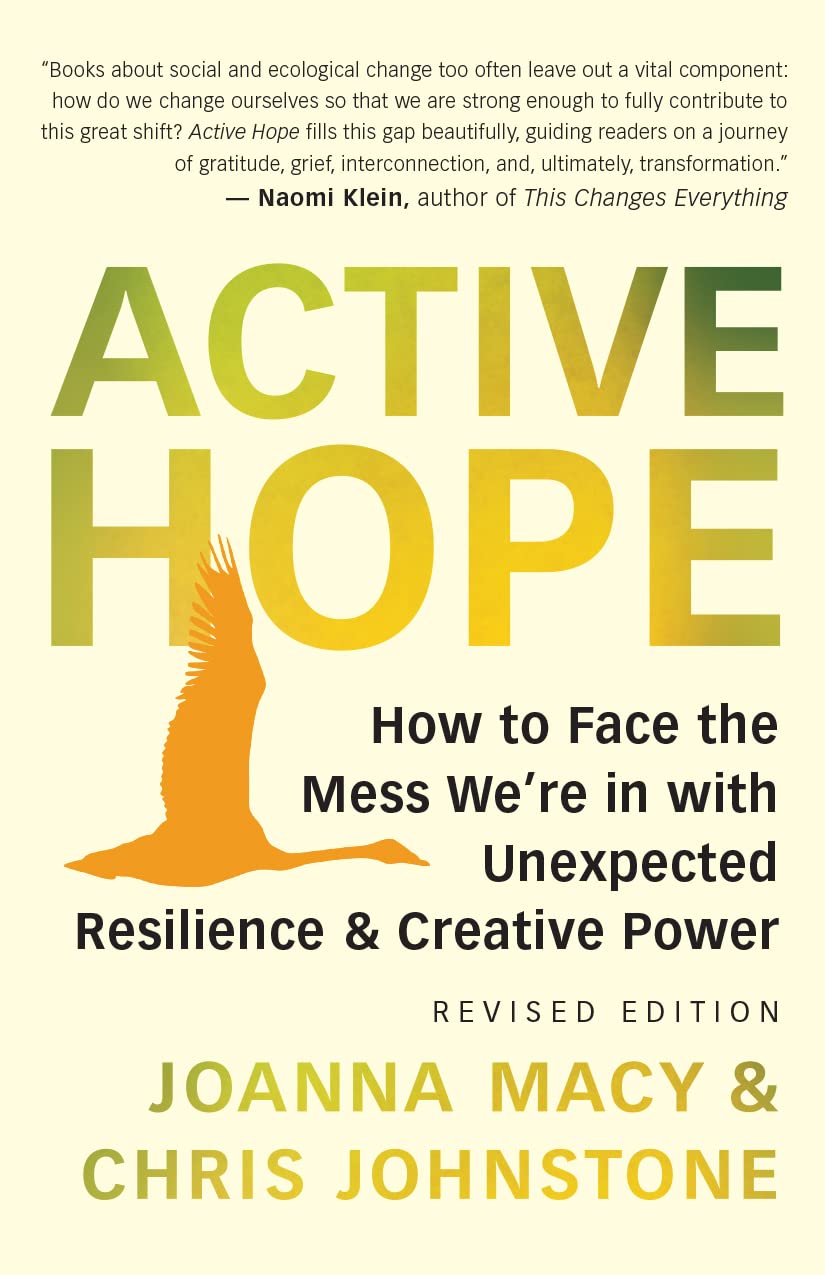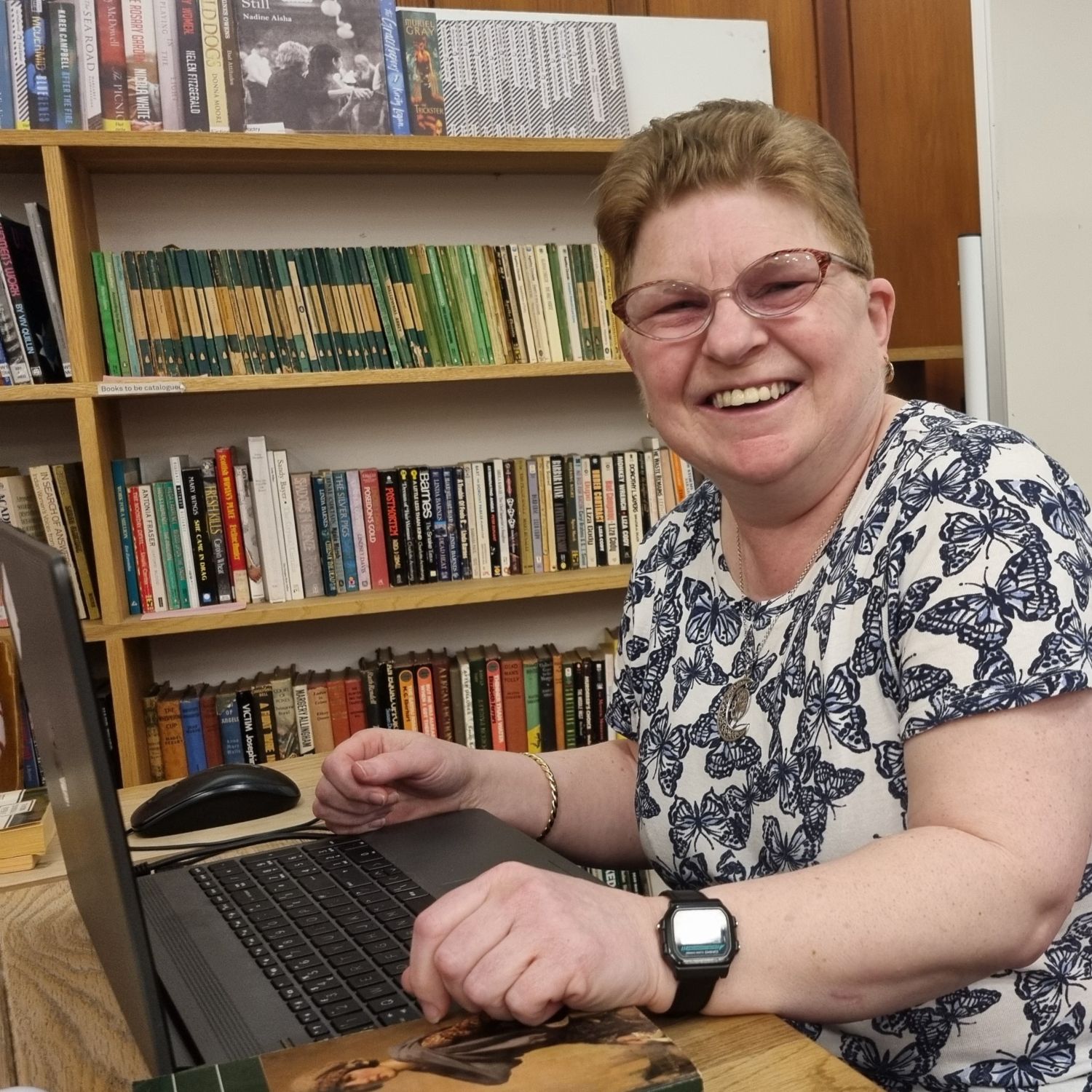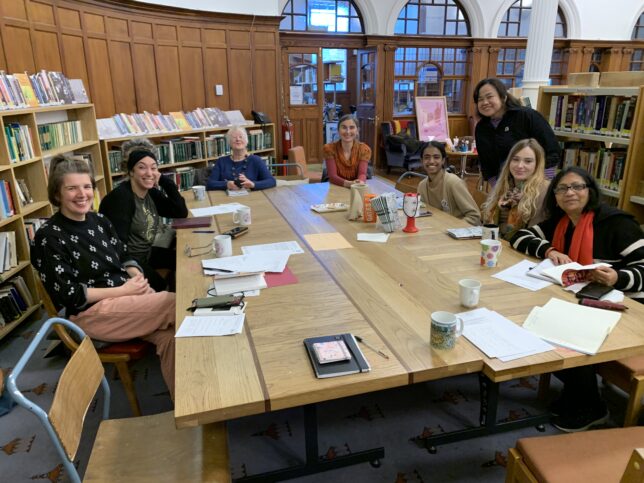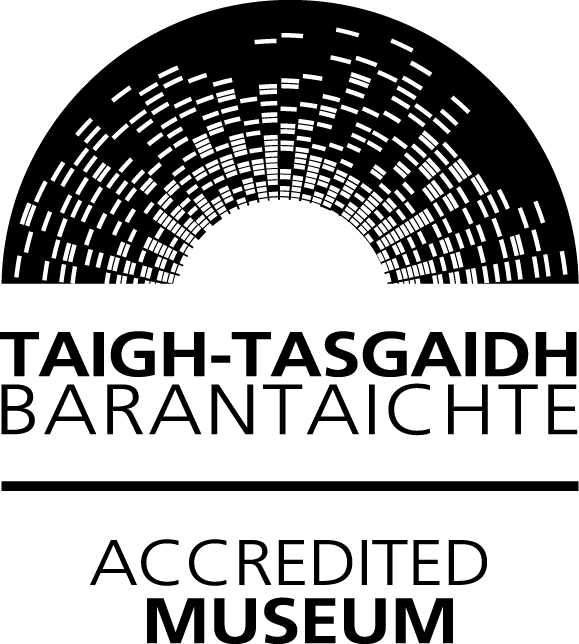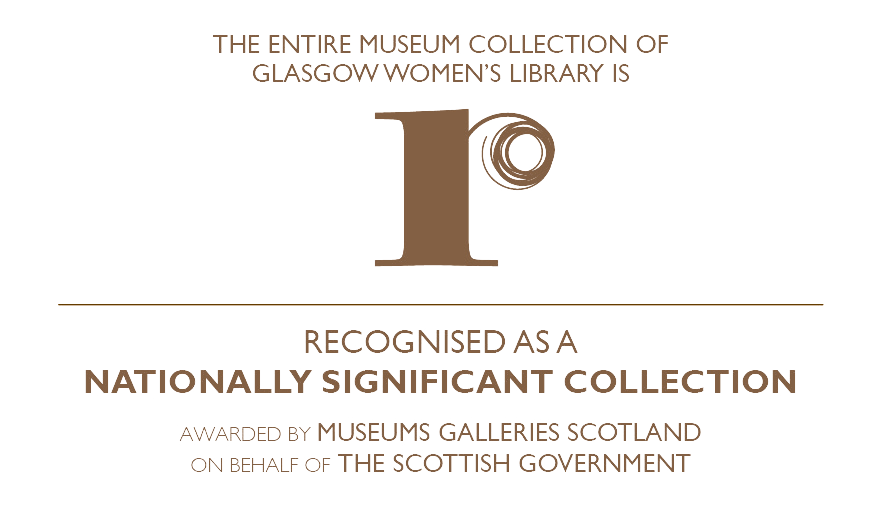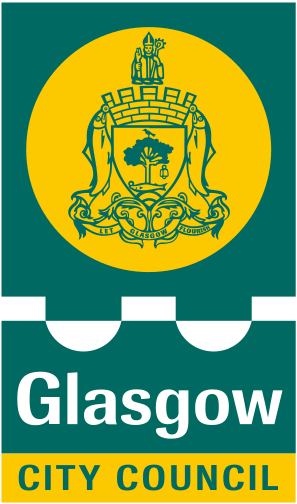My name is Hannah Rose I have been based at Glasgow Women’s Library as Creative Development Assistant Intern since April. During this time I attended the week long seminar, ‘Turning the Tide: The rise of right-wing extremism in Europe and how to tackle it peacefully through street art’ in Vilnius, Lithuania. It was organised by IFM-SEI, an international youth movement organisation. I have written this to share my small insight into what was, is and could be happening in Vilnius.
I cannot give an overview. I cannot give a historical account. For that you should come in and read Marija Gimbutas, watch Lina Žigelytė, or follow politician Marija Aušrinė Pavilionienė. What I can give you is a tiny peek into the current struggles and creativity of women in Lithuania, whose lives have touched my own here in Glasgow.
“Everybody is an artist, but only artists know it
Kiekvienas yra menininkas, bet tik menininkai tai žino”
++++++++++++++++++++++++++++++++++++++++
“Poeziją turime daryti visi kartu, o ne kažkas vienas
Poetry has to be created by everyone, not by a single person”
I found these words on the streets of Vilnius: They ask for your voice, as do they ask for the voices of everybody. What threatens this, Agnė Grigaliūnienė recently wrote, are the ‘silences we are so familiar with’; like those of Lithuania’s President Dalia Grybauskaitė who ‘keeps silent about proposed legislation on abortion and LGBT rights’, and the laws themselves which will “introduce administrative liability for organizing events like homosexual marches and parades”.
Vilnius has an “authentic European heritage – glanic, nonviolent, earth centred culture” which Marija Gimbutas explains we are only just ‘beginning to discover our long alienation from’. Yet ‘Democracy is not hereditary, therefore each generation must win their own Democracy, Gender Equality, their Right to Live in an Egalitarian Society, this is a permanent process… it is important that change becomes deeply rooted in human mentality, the mentality of society” Margarita Jankauskaitė, Politician and Human Rights Activist tells us.
In this struggle, which is ongoing, one thing challenging the silencing and forced alienation is the music voiced by female singers such as as Eglė Sirvydytė and Kamanių Šilelis. Living on in these strong voices is honour for their neolithic inheritance. They sing traditional folk songs (dainas) and build their own creations upon them. The songs sung in this beautiful and magical language retain their power regardless of whether you understand their meaning. 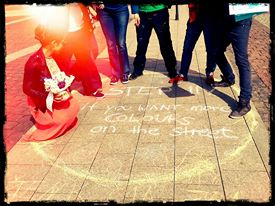
I want to see more colours on the streets. Compared to Glasgow, Vilnius centre is filled with colour: from Literatų St which has over 100 individual artworks on it, to the colourful paintwork, to the greenery and blue skies! Yet when I joined the May Day Parade, with an international youth movement, our flag of rainbow colours was confiscated and we were moved to the very back of the march.
Shortly after this incident MP Petras Gražulis proposed several new laws including fines “for organizing events like homosexual marches and parades” which he considers “ public denigration on the family foundations listed in the Constitution and organizing events that run counter to public morals”.

He also “proposed changes to the Civil Code and Children’s Rights Protection Law that would bar homosexuals from fostering or adopting children.” ‘Homosexuality’ or anything other than a heterosexual couple is seen by Petras Gražulis as a ‘cancer to be treated in the first stage’. This law is fiercely opposed by Lithuania’s vocal celebrities human rights campaigners, LGBT rights campaigners, and other politicians such as “Marija Aušrinė Pavilionienė, the most vocal (and often the only) supporter of gay rights in the Lithuanian parliament, who has put forward a proposal for a bill on partnership which includes same-sex partnerships.”
Agnė Grigaliūnienė, TV host: “ they obviously breach human rights, promote antagonism and enmities in the society. Thanks to such acts, laws, and characters, our society becomes angrier, full of lies and those awful “silences” we’re so familiar with. There are many problems in Lithuania, people are wronged, beaten, and murdered. You don’t hear Mister Gražulis making statements about that – perhaps because these issues are less suitable for political self-promotion. On the other hand, our society accepts violence of all kinds as a norm, something we must have inherited from the Soviet era. It is statements and initiatives like that that breed violence against the other and oneself.”
Artūras Tereškinas, sociology professor at Vytautas Magnus University: “Initiatives like the latest one from Petras Gražulis are only possible in Lithuania which comes to resemble Putin’s Russia. In addition to trampling on the institution of the family, Gražulis and the likes of him (recall Egidijus Vareikis) are threatening basic human rights. Lesbians, gays, bisexuals, and transgendered people are citizens of Lithuania just like everyone else. They are therefore entitled to the same rights: a right to publicly express their convictions, a right to partnership recognized by their state and to adopt and raise children.”
This law is all too familiar to us in the UK; here in Glasgow Women’s Library you can find archival boxes packed full of campaign materials, articles, studies, badges, banners against Section 2A (A.K.A Section 28) which forbid any local authority to ” intentionally promote homosexuality or publish material with the intention of promoting homosexuality” nor to “promote the teaching in any maintained school of the acceptability of homosexuality as a pretended family relationship”
To access any of this archive please make an appointment with GWL staff, and to read about some experiences of ‘everyday life of LGBT people’ in Lithuania please come in and find our copy of ‘Beyond the Pink Curtain’ with contributions from Jolanta Reingardienė and Arnas Zdanevičius.
Alternatively, if you are in Vilnius, at the end of this article I have online resources.
This street art can be found on the river banks of Vilnius, it is a creative articulation that love is equal yet different, and it calls for recognition of love and relationships without exception. For all couples to be able to adopt, and for all couples to be able to express themselves.
On the same wall you will find another voice reacting to a law being considered which ” proposes banning abortion unless pregnancy poses threat to mother’s health or resulted from rape. In such cases, pregnancy could be terminated before week 12.”
This law comes after a wave of belittling sentiments on the role of women in Lithuania: Fredrik Rydström (a distinguished Swedish academic from Vilnius University) writes “ young Lithuanians were indignantly told, by an exceptionally outspoken PM, that they indeed could not expect a descent pension in the future unless they willingly set out to produce three, or preferably four, children per family.”, concluding that what ”this nationalist discourse boils down to…is the cultivation of an archaic and misogynist stereotypical perception of women as mere wombs in the service of the sacrosanct nation.”
Jankauskaitė comments that if you dare ‘to say something different about the female experience, and it appears that there are many more of us than you thought that do not meet the ‘standards’ – they start to move and the movement escalates’, and she hopes this movement will grow and grow and will not be silenced.
In March 2012, Vilnius, four women stages a “Street Performance” which “blocked the Neo-Nazi procession of more than 1000 participants”. Lina Žigelytė interpreted this performance as a “mirror image of this crowd” showing “how distorted and fear-driven it was. These women appeared in public dressed as pregnant Roma, pressed two fingers with black nail polish above their lips to invoke Hitler’s mustache, and cried out to the neo-Nazi crowd “Freedom to Lithuania!” She adds that “these women are active in the the Roma community of of Vilnius Parubanka” and have Roma heritage. Lina Žigelytė writes from the position of an accomplished interdisciplinary artist, LGBTQ activist and art critic.
Žigelytė notes that “public protest culture here in Lithuania is negligible and stifled by strict public assembly laws.”, this protest of four solitary women then poignantly reflects the repression of women’s and LGBTQAI voices. If you can imagine the amount of people who do not fit into the strict view of ‘Lithuanian’ that is to say do not have a nuclear family, do not have a fully ‘Lithuanian heritage’, or people who are pro equality and human rights; I believe you can see a blockade much larger than 4 people, much larger than 1000, in fact, it is one much similar to the Baltic Way or Baltijos kelias.
What the streets of Vilnius encourage, and what is inherited from the neolithic times is an equal and peaceful society in which each voice is expressed and valued. In this context you will no longer have to imagine these silenced voices, but will be able to hear them in full clarity and magnificence.
+++ Further Reading +++
Articles:
Articles in Defending History by Lina Žigelytė
Articles in Baltic Worlds: by Inga Aalia & Kjetil Duvold
Articles in The Lithuania Tribune by Fredrik Rydström
Article in The Lithuania Tribune regarding MP Petras Grazulis
Article by The European Parliament’s Intergroup on LGBT Rights article on the laws in Lithuania
Article in www.lrytas.lt, ‘Socialdemokratai Gedimino Prospekte Plazdėjo Raudonomis Vėliavomis’
Essay in Beyond the Pink Curtain’ by Jolanta Reingardienė and Arnas Zdanevičius.
Article in 15min.lt ‘Lithuanian President Keeps Silent About Proposed Legislation On Abortion And LGBT Rights’
Article in 15min.lt ‘Lithuanian Celebrities Come Out in Support of LGBT rights‘
Book:
The Language of the Goddess by Maria Gimbutas
Videos:
Laida Zibute youtube channel by Lina Žigelytė
Signs Out of Time: The Story of Marija Gimbutas
‘Women Inspiring Europe, interview with Margarita Jankauskaitė by European Institute for Gender Equality
Footage of The Baltic Chain/Way, in which 2 million people stood holding hands in a chain connecting up the Baltic States
Video footage of Street protest performance
Music:
Eglė Sirvydytė: Aitvarai , Tracks , and in session
Kamanių Šilelis: Žuvų Šukelėm , Miestuos , Septintą Dieną
Links:
Lithuanian youth falcon movement: http://www.sakaliukai.lt/news.php
U.K Youth movement: http://woodcraft.org.uk/
International Youth movement who organised the seminar: http://www.ifm-sei.org/
Archive:
Archive in Glasgow Women’s Library on Section 28/2a aka clause 28.

